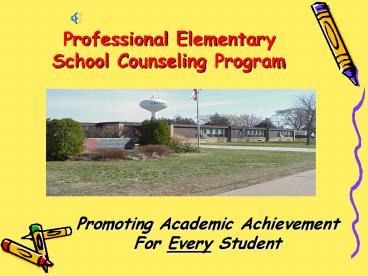Professional Elementary School Counseling Program - PowerPoint PPT Presentation
1 / 28
Title:
Professional Elementary School Counseling Program
Description:
Professional Elementary School Counseling Program Promoting Academic Achievement For Every Student Mission of The Camanche School Guidance and Counseling Program . . . – PowerPoint PPT presentation
Number of Views:924
Avg rating:3.0/5.0
Title: Professional Elementary School Counseling Program
1
Professional ElementarySchool Counseling Program
Promoting Academic Achievement For Every Student
2
Mission of The Camanche School Guidance and
Counseling Program . . .
is to ensure that every student will be provided
the opportunity to acquire skills in academic,
career, and personal social development which
will prepare them to become successful productive
citizens in a diverse technological ever changing
global society.
3
FOUNDATIONASCA National Standards
4
DELIVERY
- Classroom guidance curriculum
- Individual and group counseling sessions
- Responsive services such as crisis counseling and
conflict resolution - Supporting the school system through supporting
teachers, students and staff with conflict
managers, mentoring programs, TAT, the special
education team, the district safety committee,
Bullying Prevention Committee, etc. . .
5
MANAGEMENT
- School counselors use data to drive their
decisions - Develop yearly action plans
- Monitor student progress
- Principals agreement
6
ACCOUNTABILITY
- School counselors measure the results of their
programs. - Use this data to make decisions regarding program
improvement.
7
GUIDANCE CURRICULUM
- Kindergarten
- DUSO (Developing Understanding of Self and
Others) - Grades K-4
- Character Counts
- Decision Making (THINK, PREDICT, CHOOSE)
- Bullying Prevention / Social Skills/ Empathy
(Dont Laugh at Me) - Drug Alcohol Prevention (Just for Me Series)
- Grades 1-4
- Diversity Career Choice
- Grades 1-4
- Test Taking Skills
- 4th Grade
- Middle School Transition
8
INTENTIONAL GUIDANCE
- Attendance
- Behavior
- Academic Achievement
9
Camanche Elementary School
- School Counseling and Guidance Program
- Results sample
10
National Standard
- Students will acquire the attitudes, knowledge,
and skills that contribute to effective learning
in school and across the life span.
11
ASCA Competency
- Improve Academic Self- Concept and Achieve School
Success
12
Study Skills Groups
3rd and 4th Grade Students
- ITBS Data, Low Scores
- Teacher Academic Referral Check List
- Teacher Interviews
- Student/Parent permission letters
13
GROUP COMPOSITION
- 14 ADD/ADHD
- 17 LOW SOCIO ECONOMIC
- 14 SPECIAL EDUCATION
- 17 Were in 2 or more of the categories above
- 22 BOYS AND 9 GIRLS
- 19 3RD GRADE STUDENTS
- 12 4TH GRADE STUDENTS
14
Camanche ITBS Math Trend All 4th Grade Students
Percent of students Proficient
15
Camanche ITBS Reading Trend All 4th Grade
Students
Percent of students Proficient
16
Pre-Study Skills Group Comparison of students
on Free and Reduced Lunch (low SES) verses
those not on Free and Reduce lunch (Non SES)
who scored 42 or below on the ITBS
Number of ITBS scores below 42
Data showed that both Low SES and Non SES
students qualified for a Studies Skills group.
17
Study Skills GroupPre/Post Test Results
140 of 196 Right answers
40 Increase!
18
Confidence / Knowledge students who could name
one thing he/she does well and share this with
others.
Number of students With the correct response
out of 31
40 Increase
19
Skill /Organizationstudents who reported they
could complete a schedule for doing homework and
follow it.
Number of students With the correct response
out of 31
39 Increase
20
Knowledge / Study Skills students who knew
that different study skills work for different
people.
Number of students With the correct response
out of 31
90 Increase
21
Attitude/Homework Completion students who
believe it is important to turn in homework when
it is due
Number of students With the correct response
out of 31
28 Increase!
22
Knowledge / Organization students who knew how
to organize homework to take home and get
completed work back to school
Number of students With the correct response
out of 31
53 increase
23
Skill / Test Taking students who know to go
with their first response on a test
Number of students With the correct response
out of 31
50 Increase
24
Knowledge / Test Taking students who knew it
was important to stay calm and relaxed when
taking the Iowa Test of Basic Skills
Number of students With the correct response
out of 31
56 increase
25
ITBS growth for students in the Study Skills
group Spring 2005- Spring 2006
ITBS Score National Percentile
26
75 (24 of 32 students in the group) HAD AN
INCREASED SCORE IN MATH READING OR BOTH ON THE
IOWA TEST OF BASIC SKILLS
27
Post Student Interviews Regarding The Use Of
Strategies Learned in a Study Skills Group
28
Implications
- Teaching Study Skills contributes to improved
academic achievement .
29
The End































